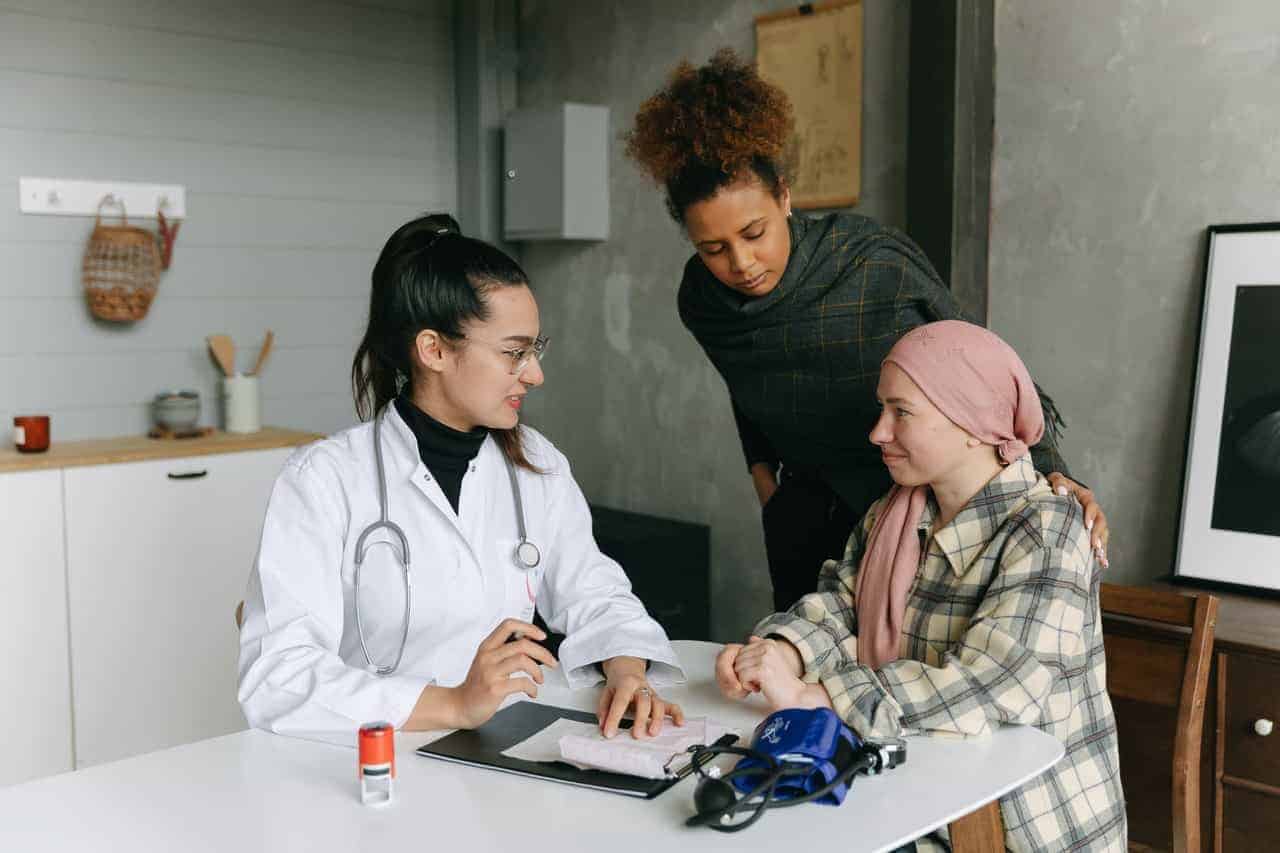– Are you suffering from PCOD?
– If so, how do you know that you have it?
-What symptoms does a person who has PCOD experience?
– Do you think you have PCOD, or are you just guessing?
-What treatments are there for this condition?
If you have these kinds of questions in your mind then you should need to read this article very carefully. Here I explained everything about PCOD.
What is polycystic ovarian disease?
 Polycystic ovary syndrome (PCOS) is the most common cause of female infertility. In this condition, the ovaries are not releasing the right amount of hormones to support a pregnancy. In addition, the body may produce too much of one type of hormone or not enough of another.
Polycystic ovary syndrome (PCOS) is the most common cause of female infertility. In this condition, the ovaries are not releasing the right amount of hormones to support a pregnancy. In addition, the body may produce too much of one type of hormone or not enough of another.
The result can be irregular menstrual periods, excessive facial hair growth, acne, and weight gain or loss. In the past, PCOS impacted only women, and however, men may also have PCOS. This syndrome is also called “androgen excess” or “hyperandrogenism.
The problem with PCOS is that the ovaries do not release the right amount of hormones. It causes the body’s levels of insulin to rise. If the insulin is not regulated correctly, the pancreas will not control the glucose in the blood.
It can lead to high blood sugar and the possibility of diabetes. The other issue is that the body may produce too much of one hormone or not enough of another. It can cause several problems.
For instance, if you have too much insulin, it will help the body store fat. Also, the thyroid gland can be affected. If you don’t have enough thyroid hormone, you could get tired very quickly.
This condition affects more than 5 million American women and causes them to have irregular menstrual cycles. This syndrome calls “female obesity” because the affected women have excess body fat in their ovaries. They tend to be overweight and often have high blood pressure, diabetes, heart disease, sleep apnea, and depression.
A woman with PCOS has excess amounts of androgens. It causes her ovaries to grow follicles or eggs. However, the egg is not fully mature. The excess androgens also cause the endometrium (lining of the uterus) to become thicker and less receptive to the fertilized egg. These conditions cause a delay in the normal process of ovulation.
Polycystic ovarian syndrome symptoms:
 PCOS symptoms are varied and include weight gain, hair growth, menstrual irregularities, and acne. In some women, the ovaries also grow cysts or abnormal lumps. The exact causes of PCOS are unknown. A woman who is overweight can be more likely to have PCOS. PCOS affects about 7 percent of women in the United States.
PCOS symptoms are varied and include weight gain, hair growth, menstrual irregularities, and acne. In some women, the ovaries also grow cysts or abnormal lumps. The exact causes of PCOS are unknown. A woman who is overweight can be more likely to have PCOS. PCOS affects about 7 percent of women in the United States.
This condition can be hard to diagnose because many of the symptoms are similar to regular menstrual cycles. However, if you have unexplained weight gain, irregular periods, or hair growth, you should talk to your doctor about PCOS. There are treatments available to help you get pregnant.
PCOS is an illness that has many causes and symptoms. It usually happens when a woman has her first menstrual period. However, sometimes it occurs when a person is about to reach menopause. It is because the ovaries stop producing eggs, which makes a woman infertile.
When a woman with PCOS starts having periods again, she will have many small cysts (pockets) on her ovaries. These cysts are filled with fluid and can increase in size over time.
Polycystic ovary syndrome (PCOS) is a condition in which the ovaries have many small cysts or “lumps” of fluid.
The cysts may become very large, causing the ovaries to be too large or even fall off. In some cases, the cysts can rupture and release the contents of the cyst into the body. In rare cases, cysts can cause infections in other parts of the body. Some people who have PCOS also have insulin resistance or diabetes. There is no cure for PCOS, but there are treatments available that can help reduce PCOS symptoms.
If you have PCOS, you may have symptoms of increased hair growth, acne, irregular periods, weight gain, or decreased sex drive. If you have PCOS, your ovaries may not produce enough testosterone or estrogen, which controls fertility and menstruation. It may affect your menstrual cycle, and you may experience problems with pregnancy or menopause. It may be difficult for you to get pregnant or to become pregnant at all.
You may have excess hair growth on your face, arms, legs, or body. Acne is another common symptom of PCOS. You may also have a strong urge to eat certain foods or to drink alcohol. In some cases, this urge to eat or drink may be so strong that it interferes with your daily activities. You may feel the need to eat or drink even when you are not hungry or thirsty. It can cause you to put on extra weight.
Causes of Polycystic Ovary Syndrome:
 Polycystic ovary syndrome (PCOS) is a common hormonal disorder that affects millions of women. Young women have an issue during their childbearing years. Symptoms can vary from woman to woman, but they often include excess hair growth, irregular menstrual periods, weight gain, and acne. Although several treatments are available, most women with PCOS have to live with them for the rest of their lives.
Polycystic ovary syndrome (PCOS) is a common hormonal disorder that affects millions of women. Young women have an issue during their childbearing years. Symptoms can vary from woman to woman, but they often include excess hair growth, irregular menstrual periods, weight gain, and acne. Although several treatments are available, most women with PCOS have to live with them for the rest of their lives.
PCOS is a disorder of the endocrine system. Your glands make hormones in the body, and these glands are called endocrine glands. Your hormones control many different functions in your body. For example, hormones make it possible for your body to grow and develop. They regulate the amount of energy you have and how much you sleep.
They help you control your appetite and moods. They also hold your sex drive and menstrual cycles. Hormones can also help your body deal with stress, regulate your blood sugar levels, and ensure your immune system works properly.
Two primary hormones affect women with PCOS: insulin and testosterone.
Insulin is a hormone that your pancreas makes. Insulin helps your body use energy from food, and it keeps your blood sugar levels in check. If you do not produce enough insulin, you may feel hungry even though you are not. You may also have a strong urge to eat foods high in carbohydrates, which may cause you to gain weight.
Testosterone is another hormone produced by the ovaries. Testosterone is a male hormone. In women with PCOS, the amount of testosterone in the body may be too low. It may make it difficult for your body to menstruate regularly or to conceive children. It may also make it harder for you to maintain healthy body weight.
If you have PCOS, you may also have problems with insulin resistance. Insulin resistance means that your body is not able to use insulin properly. The pancreas continues to make insulin, but it does not work as well. The result may be that you gain more weight than usual, and your blood sugar levels are higher than average. You may also develop type 2 diabetes.
Insulin resistance can be the reason for lifestyle factors such as poor diet and lack of physical activity.
It can also be a symptom of other health conditions, such as obesity, hypertension, or PCOS. Some people who have PCOS also have high cholesterol levels or high triglyceride levels. High triglyceride levels are called hypertriglyceridemia. It can cause the small blood vessels in your body to become inflamed. This condition is called atherosclerosis.
How To Get Rid Of Polycystic Ovarian Disease:
Polycystic ovary syndrome (PCOS) is a condition that affects the function of the endocrine system in women. The symptoms include irregular periods, excess hair growth, and acne. PCOS can lead to weight gain and other problems in women.
There are many ways to get rid of PCOS. One way to treat this condition is through exercise and diet. Exercise will help you lose some extra pounds while diet will also improve your overall health.
It would be best if you tried exercising as much as possible. Try running on the treadmill or riding a bike. You can also play basketball or tennis, and everyone can do these activities for 30 minutes or more a day. If you’re not in shape already, try to start slowly. If you’re not used to working out, it is best to go slow. This way, you won’t harm yourself.
Also, it would be best if you tried to eat a healthy diet. Avoid sugary foods and eat fruits, veggies, lean meats, and fish. Limit the number of carbohydrates you take in, and don’t eat anything that is fried. You should also make sure that you drink plenty of water every day, and it will help you stay hydrated and flush out toxins from your body.
It would be best if you also stopped taking birth control pills. Birth control pills can cause weight gain, which can lead to problems such as PCOS. If you have PCOS, your doctor may recommend you take birth control pills; however, this might cause weight gain, which can be a problem.
Instead of taking them, you should try to find other ways to get rid of this condition. There are natural remedies for PCOS that will help you get rid of this condition and make you feel better.
Some of the best-known and effective natural remedies for PCOS are Vitamin D3, zinc, vitamin B6, magnesium, and potassium. Vitamin D3 and zinc are minerals that can help in regulating the function of hormones in the body. Vitamin B6, magnesium, and potassium are nutrients that are essential for our body. These nutrients can boost our energy levels, improve digestion, and regulate the function of our endocrine system.
If you have PCOS, you should talk to your doctor about this. Your doctor will recommend natural remedies for PCOS, and however, you should always follow their instructions. Some of these natural remedies for PCOS may be harmful to your body if you misuse them.
Polycystic ovarian disease (PCOD) is a common problem faced by most women. If you are suffering from PCOD, you should be worried about the health problems you will face in the future.
If you want to get rid of this problem, then you must take specific steps. We all know that PCOD can be easily controlled by diet and exercise, but if you don’t follow these steps, you might be unable to get rid of this problem.
Here are some tips to get rid of polycystic ovarian disease:
Exercise daily:
Exercising is the most important thing for women, and it will make your body healthy and fit, and it will also help you control your weight.
Have a balanced diet:
Your diet has a significant impact on your body, and it is the most crucial aspect when it comes to PCOD. You need to include all the nutrients in your diet, so you must eat all the essential foods like fruits, vegetables, nuts, and proteins.
Avoid junk food:
If you are using junk food, you must avoid that as they are not suitable for your body and can even cause health issues.
Avoid taking pills:
You must avoid taking any pills or tablets, as they may have adverse effects on your body. You should always consult your doctor before taking any medication.
Drink lots of water:
You need to drink lots of water to keep yourself hydrated to avoid getting dehydrated and facing health problems.
Conclusion:
These are some of the practical tips for getting rid of PCOD. If you follow these tips, you will get a healthy body and a fit body.
We are young/teen girls and boys. We enjoy our life using travel blog and outing and watch people lifestyle blog. We try to share our knowledge and what we are looking. We discussed with various people from our and other countries about fashion blog and health blog related knowledge sharing. We get tips and just share it. Some of us are pure technology blog love guys and girls those are also sharing some tips about internet and business blog related. Some of my friends share knowledge on baby care , home improvement and general knowledge. You can easily read our blogs on your free time or on Sunday and get more information with enjoy knowledgably sharing. That’s why we called as Sundaybestblog.
Share This!!











